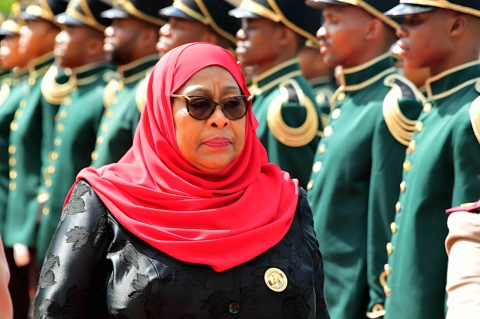
The abductions and murders of political opposition leaders in recent months raise questions of how peaceful and fair elections will be on November 28 and in October of 2025.
The following article was published in the November-December 2024 issue of NewsNotes.
On September 6, Ali Mohammed Kibao, a leading member of the Party for Democracy and Progress (Chama Cha Demokrasia na Maendeleo, CHADEMA), was snatched off a bus on the outskirts of Dar es Salaam. Several hours later his dead body was found in bushes with his face disfigured by acid.
This incident followed several other murders and abductions of opposition party members and resulted in the United States and several European countries calling for thorough investigations into these deaths. President Samia Suluhu Hassan of the ruling CCM Party objected to “outsiders” intervening in Tanzania’s domestic matters and said that the government is capable of conducting the investigations itself.
Freeman Mbowe, the presidential candidate for CHADEMA, called for Scotland Yard to lead the investigations of these incidents, stating that they did not trust Tanzanian law enforcement to conduct a “proper and transparent” inquiry. The party organized peaceful protests to take place in Dar es Salaam on September 23, but earlier that morning the police detained Mbowe and Tundu Lissu, CHADEMA’s deputy, plus twelve other party leaders. They had also been briefly detained back in August and in 2017 Lissu had been the target of an assassination attempt.
After what was viewed as the increasingly authoritarian presidency of John Magufuli, Samia Suluhu Hassan declared in 2021 that, under her presidency, the government would defend democracy and not tolerate brutality. But recent events raise fears that the Sululu government is reverting to Magufuli’s repressive tactics, threatening the peace and fairness of local elections on Nov. 28 and the presidential election in 2025.
Despite assertions that it defends democracy, the Tanzanian government on October 3 suspended Mwananchi Communications Limited (MCL), publisher of several popular print and digital news publications in Tanzania, for thirty days for what it alleged to be prohibited content. Two days earlier, MCL, published an animated explanation of the abductions and deaths of members of the opposition party, an action the government said would bring “ridicule to and harm the reputation of the Republic of Tanzania.”
Tanzania’s ruling party, Chama cha Mapinduzi (CCM), Swahili for Revolutionary Party, is the successor to the Tanzania African National Union (TANU), the independence party of 1961. In 1992, Tanzania transitioned to multi-party democracy and subsequently several opposition parties ran against CCM, but with limited success. However, there has been a steady increase in the number of opposition candidates elected to Parliament, from 23% in 1995 to 30% in 2015. CHADEMA originated in 1995, but gained only 6% of the presidential vote, which grew to 40% in the 2015 election.
In 2020, President Magufuli, running for re-election, became alarmed over CHADEMA’s political strength and Mbowe’s popularity, and the elections that year were referred to as the most rigged and violent Tanzania ever experienced. Beginning in June of 2016, Magufuli banned opposition rallies and restricted public funding for opposition parties. Tundu Lissu had his vehicle sprayed with bullets; Mbowe was arrested and his business destroyed. After Suluhu became president in 2021, she had Mbowe detained for eight months.
Mbowe has proven to be an effective organizer of the CHADEMA political party and has built it up to be the only opposition party in what is now a de facto two-party state.
After the 2005 election, Mbowe focused on making party operations effective and used helicopters to travel to far-flung parts of the country. By 2010 CHADEMA had a country-wide presence and, by running on an anti-corruption platform, both the party and Mbowe greatly improved their popularity.
Another method Mbowe used to build the CHADEMA party was “walking rallies” where opposition leaders address the public as they walk together through a community since the Magufuli government had banned opposition rallies.
Mbowe’s careful, pragmatic approach to politics and his huge national popularity have made the CCM party concerned about losing future elections. It remains to be seen whether the elections in November and next year will be peaceful.
Correction: A previous version of this article stated incorrectly that CHADEMA originated in 2005, when in fact it was founded 20 years earlier.
Photo of President Samia Suluhu Hassan of Tanzania inspecting the Ceremonial Guard of Honor during the welcome ceremony on the occasion of a State Visit to South Africa held at the Union Buildings, Pretoria, by GCIS, CC via Flickr.
